‘Our children are dying’: Faith-based groups look to heal Chicago amid rising violence
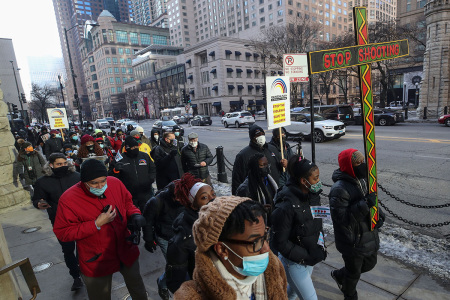
2021 was the most violent year Chicago has experienced since the birth of the 21st century, according to recently released data from the Cook County Medical Examiner's Office.
The office reported 820 homicides in the Windy City in 2021, the highest since 1995, when 828 murders were reported, according to the Sun-Times Media Wire.
"We all know this has been a challenging year here in the city of Chicago," said Police Superintendent David Brown on Thursday. "Too many families are reeling from the loss of loved ones due to senseless gun violence ... Too many residents are dealing with the ripple effects of this trauma due to crime in our community."
In late November, the Cook County Medical Examiner’s Office issued a report confirming that the number of homicides in the county had passed 1,000 by the end of Thanksgiving.
Of the 1,009 confirmed homicides, 777 of them occurred in Chicago. It was the largest number of murders in the county since 1994, when the office reported 1,141 homicides.
In early July, The Chicago Tribune's crime team released data showing that there had been 2,021 shooting victims in the city through July 7, which was 164 more than at the same point in 2020.
These and other statistics have led many to call Chicago the pejorative nickname “Chiraq,” the idea being that some parts of the city are more violent than war-torn countries like Iraq.
Pastor Isaac Paintsil, head of Christ’s Oasis Ministries, a multisite congregation with campuses in and near Chicago, told The Christian Post that the rising violence is “horrendous” and “heartbreaking.”
“At a certain point, how can mothers be grieving and families be grieving, fathers be grieving week after week after week after week?" Paintsil asked. "This is the real challenge that we are having, and the emotional toll on us is just unbelievable."
Paintsil is among a number of pastors who connected through a group called the Chicago Pastors Rally, which brings together clergy from across the city to engage in events, such as a prayer rally held every two weeks and breakfasts with local officials.
“We have what we call the unity torch,” said Paintsil, noting that the object symbolizes peace and is comparable to the Olympic torch. “It just passes from one church to another.”
“Wherever the torch is located, they spend a certain amount of time in prayer, praying for peace and harmony among our communities and churches.”
CP reached out to several ministries and faith-based groups to learn more about how the violent crime rate has impacted them and find out what they're doing to improve their city and what they believe needs to be done to bring about sustainable change.
‘Our children are dying’
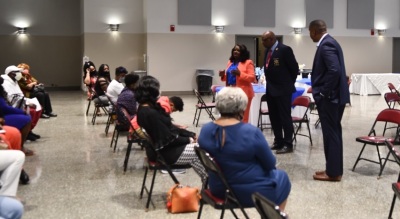
Sylvia Bennett-Stone is executive director of the Voices of Black Mothers United, an organization with chapters across the country that seeks to heal crime-ridden communities.
The organization is overseen by black mothers and community leaders. It is supported by the Woodson Center, a nonprofit that focuses on improving low-income neighborhoods.
Bennett-Stone, whose daughter was killed in a crossfire between two gunmen in 2004, told CP that her organization was in the process of setting up a new chapter in Chicago.
"We recruit mothers who have lost children and are well enough and cared enough to go back into the community and make some changes,” said Bennett-Stone.
"We've lost children to violence, but we also are mothers who are healed. And we believe, we totally believe that if mothers heal, then families heal. And if the family heals, then the community heals."
Bennett-Stone says Chicago's problems are “multifaceted" and are impacted by drug addiction, gang violence, lack of income and mental illness.
"Our children are dying. It’s no longer just adults or people who are involved in the violence. It is our babies that are dying. It is our babies that are getting caught in the crossfire,” she said. “My baby was caught in the crossfire. And it’s no longer just an issue that's contained in one area. It’s everywhere."
Pastor Ira Acree, who leads Greater St. John Bible Church of Chicago, said his congregation has been “devastated” by the rising violence in the city and surrounding county.
“Our community, everybody in our church, they either have someone in their family that has been affected by violence or they know someone personally, whether it’s a friend or neighbor, who has been impacted,” said Acree.
“We are quite familiar and quite acquainted with the impact of violence."
Acree agrees that a “myriad of things” are driving the rising violence, including a decision by the Chicago Board of Education in 2013 to close 50 schools, the shuttering of multiple mental units, and what he described as “disinvestment by powers that be.”
“There's been a cumulative failure in multiple institutions,” he said. “They have concentrated on building up the North Side and the downtown parts of our city, which are the more affluent areas, and they have left the poor communities out here by themselves."
He also cited issues like “police reform,” telling CP that “we are still hoping for that to take place, but there's still an issue with police being trusted in our community."
Action and prayer
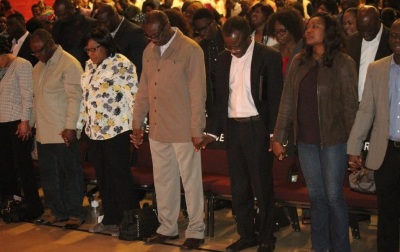
Chicago Pastors Rally member Pastor Joseph Rhoiney of First Progressive Church of Chicago said that member churches are each “doing things in their individual locations that they feel are working.”
“The idea is that there is a branch that guides to the root, and the root is faith, hope, and love and peace. And we continue to multiply and magnify that as manifested in different areas,” he said.
As an example, Rhoiney described an intergenerational “buddy system."
"We have the young people buddy with somebody. Something happens that they feel unsure about, they can call the buddy," he explained.
“The buddy system says, ‘I’m not in this by myself,’” he added. “Somebody else is partnered with me, and we’re partnered with another group for this one thing called peace within the community, peace within ourselves.”
There were also events that included competitions involving mental, physical and spiritual prowess played between younger and older individuals to help “get the two generations talking, physically engaging one another.”
“The ultimate goal is to have the connections between the older generation and the younger generation. And every time we’ve done it, we’ve had tremendous success with it,” continued Rhoiney.
“Because we see that peace can abide between the two, and the young people can learn to trust the old people, and the old people can see how they can share and receive openly how the young people feel.”
Acree of Greater St. John Bible Church of Chicago said his church has an after-school program that aims to “keep a lot of children out of harm's way" and offers safe party events on Friday evenings twice a month.
Greater St. John Bible Church also coordinates a “faith-based first responders training to help with trauma” alongside other local congregations, according to Acree.
"Although we try to be proactive in these urban communities, until there's a radical change, there will be trauma. And so, we deal with how to respond to violence when it happens,” he added.
Gun buyback events
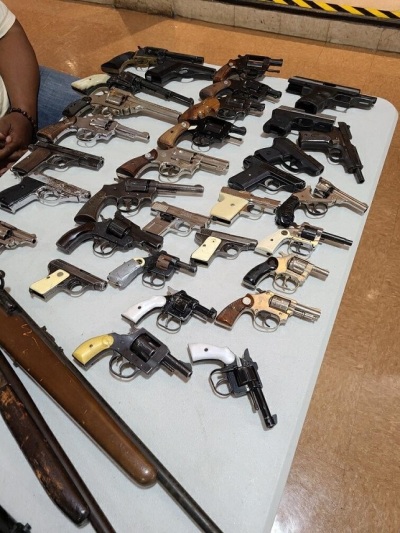
Some congregations in Chicago and elsewhere have held gun buyback events with the intention of helping to stem the tide of firearms-related violence in the city.
These events typically involve people bringing guns to a church and anonymously selling them to the congregation without any questions being asked.
In July, the Chicago-based Faith Community of Saint Sabina held a multiday buyback event that saw 123 handguns, 31 rifles and one assault weapon bought in the first two days.
The Rev. Michael L. Pfleger of Saint Sabina Church told CP in an interview that they “were able to meet and speak to many young brothers to help turn their lives around.”
“We are continuing to try many things to stop this senseless killing,” Pfleger said at the time, listing other events centered on this effort, including weekly peace walks and block parties. “This is just one more application.”
Acree of Greater St. John said that while his congregation has done such events in the past, he has had some doubts about their effectiveness.
"I'm not a real big fan of it. If the police want to do it, the superintendent wants to do it, I'll try to support them. I've got to give them an opportunity to work his vision for what he believes," said Acree.
"I'm certainly not a police officer. I'm not a law enforcement expert. But I personally have my thoughts about how all the good guys are turning in their guns but the thugs still have theirs."
Paintsil noted that he was unaware of any of CPR’s member churches doing a gun buyback event and felt he could not respond on whether they worked.
‘Boots on the ground’
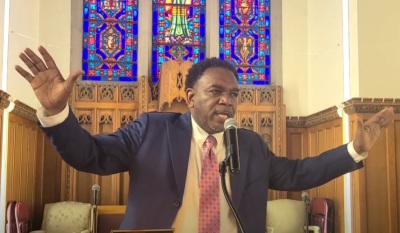
Bennett-Stone of Voices of Black Mothers United, told CP that she believes there needs to be more direct engagement between officials and the community.
"Based upon my observations, they need to come outside and work with the boots on the ground,” Bennett-Stone asserted. “Typically, city officials in government agencies engage more with larger organizations. However, larger organizations deal with people that come to them.”
“The boots on the ground go to the people. So they need to look at the real grassroots organizations that [are] going to the neighborhood where it is gang-infested and work with those people; help them, help support those grassroots. Because they are meeting people where they are."
Bennett-Stone told CP that houses of worship have a role to play in combating the violence, but stressed that “they need to come outside of the walls.”
“Churches have been the guiding light for years in urban communities,” she said. “However, churches need to come outside of the walls and engage with the community and understand what are the factors, what ministering can be done."
Acree echoed the “boots on the ground” comment, believing that there needs to be more investment in the South Side and West Side, including investment in education.
“They need to also realize that building up schools is a path out of this trauma that we are in, the mayhem that we're in. Building an education, eliminating schools is not the answer,” he said.
"I also believe they can build to capacity of these community organizations are there already with boots on the ground.”
Acree felt that officials tend to “fund the outside organizations who come in as the savior."
"They give them tons of money, but I think ... they should make a concerted effort to build up the people who are there on the frontlines," he said.
“Some of these churches have feeding programs, some have afterschool programs, some have mentoring programs. These [are] people that live here, that work here and they are going to be here, for the most part,” the pastor added.
"They need to learn how to see the importance of building up these home-grown institutions who are going to be here, come what may."
Paintsil also believes there needs to be “stronger relationships with the faith-based communities." He said one reason “we are not able to carry out the work at the degree that we would like to, definitely is finances.”
“I know that quite a lot of support comes in for different things, but I always call the Church the spiritual levy. Because when the levy is breached, everything breaks down,” said Paintsil.
Rhoiney of First Progressive Church stressed the spiritual need that must be part of the change. He noted that in the Bible, whenever the land was in turmoil, rulers went to the prophets and the Church for help.
“I think we all need to stand up and say that’s what we are, and respond in such a way that affects peace and harmony and goodwill for all men,” said Rhoiney.
“We all carry multiple titles, whether we are editors, writers, reporters, pastors, doctors, engineers, accountants, global communicators, broadcasters, it makes no difference. You are Christians. Your witness should rise inside your office to affect the change for the greater good and the greater community.”





















